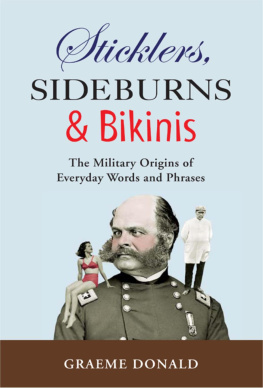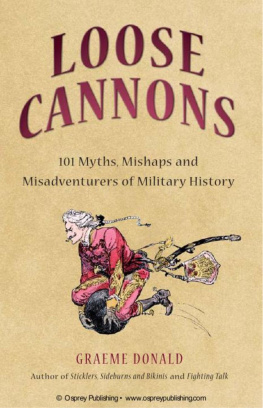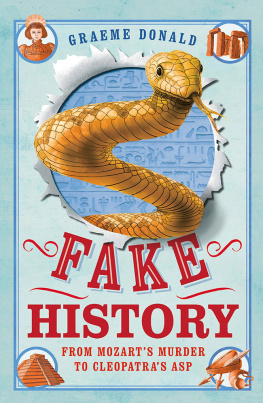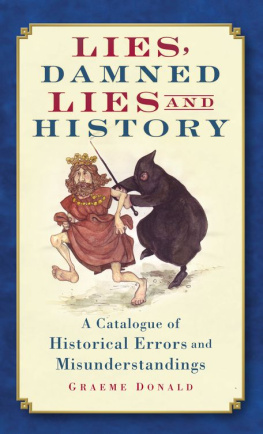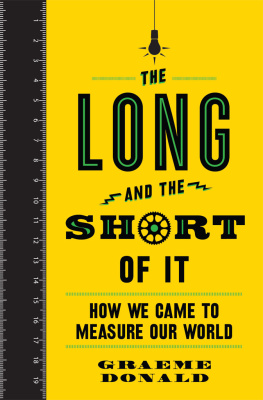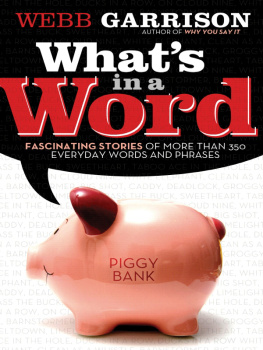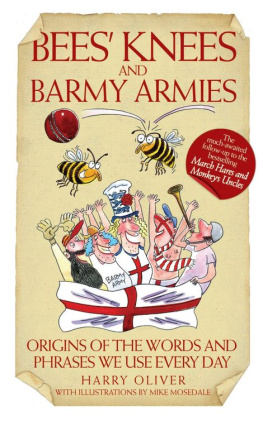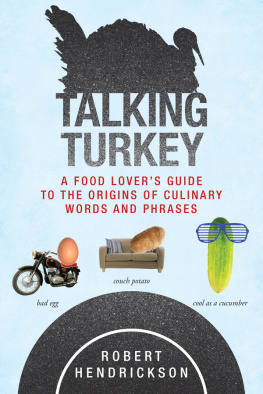The Military Origins of Everyday Words and Phrases
GRAEME DONALD
DEDICATION
For my loving wife, Rhona, who has to put up with me but with a very special thanks to all the forces personnel who stand their watch so that the rest of us can sleep easy at night.
CONTENTS
INTRODUCTION
Given the time, effort, and money that the human race has invested in depleting its own numbers, it is perhaps not surprising that so many expressions in everyday use in the English language come from the field of military endeavor.
Many are, as one might expect, home-grown in both the British and American forces, but others have come from contact with troops of other nations encountered either as friend or foe. From Swedish troops encountered in the Thirty Years War (161848) we adopted run the gauntlet from their field-punishment requiring the miscreant to endure the gatlopp, their word for the corridor of men armed with sticks to beat the unfortunate victim as he made his painful progress along the line.
Sixteenth-century conflict with the Dutch enriched English with talk of a lost cause being a forlorn hope, this being our corruption of the enemys verloren hoop, or lost troop, their term for the first wave of infantry sent into attack and with little chance of survival. Many standard French expressions were brought home in scrambled form by British troops returning from the trenches of World War 1; vin blanc landed in English as plonk; the informal farewell of tout lheure was corrupted to toodle-oo, which although first noted in prewar English was most definitely given longevity by its popularity in the ranks. Also brought home from the trenches were expressions of darker origins, such as going over the top to describe chaos and histrionics, and talk of those missing being left hanging on the [barbed] wire.
Other words and phrases, albeit with a forces origin, are not included, no matter their popularity, as they are too far removed from the actual business of fighting. A good example of such is scuttlebutt, a widely-used term for gossip and rumor. On an 18th-century British warship fresh water was at a premium, so the daily ration for the entire crew was issued in a special barrel lashed to a mast and with a hole, or scuttle, sawn at its widest point to prevent over-filling. Whenever three or four men gathered to drink there was an inevitable exchange of chatter. Interestingly enough, it was in America that the term first saw service as a synonym for gossip.
Nor did the military snooker make the grade for pretty much the same reasons. The game was born in 1875 in the officers mess of the British forces stationed at Jabalpur in India, where Colonel Sir Neville Chamberlain had tired of the regular table games then played. Drawing on billiards and the now-forgotten game of pyramids, he assembled all the balls on the table and concocted a set of rules with Lieutenant Colonel George Pretyman. Because it was a new game and everyone in the mess was a novice, it was christened snooker, the military slang for a first-year cadet and a term that basically meant snot-nose.
When you move into the body of the book you will come across some words and expressions that one would expect to derive from weapons and warfare, but many, such as best man, bikini, braille, garnish, morris dancing, Scotland Yard, and yo-yo might come as something of a surprise. In order to illustrate interesting links between terms, cross-references are given where necessary at the end of paragraphs for ease of use.
Researching a book such as this is a joy that frequently demands the abandonment of standard reference works in favor of talking to people with a particular and focused reservoir of knowledge. If, for example, a phrase is said to have been born of the loading techniques peculiar to 16th-century gunnery, then one is best talking to an expert in that field to make sure that artillery was indeed so loaded in that era. Such people are not always academics; my own first port of call for any question regarding small arms of the 14th to the 19th centuries is a local retired postman called Ernie Lancashire, whose knowledge concerning their design and use is encyclopedic. An invaluable starting point to hunt out such people is the ASLIB Directory of Information Sources in the United Kingdom, and staff at the Royal Armouries in Leeds have also been incredibly helpful in directing me to other such unsung heroes.
These information sources often lead to conclusions at odds with eminent works such as the Oxford English Dictionary (OED) and readers will find examples of such derivations offered here. For instance, the OED notes the first use of cold shoulder as a rebuff in the novel The Antiquary (1816) by Sir Walter Scott, but cold shoulder of mutton as a dish quite obviously carried derogatory overtones long before 1816. In The Craven Street Gazette (1770), Benjamin Franklin speaks scathingly of being presented with such a dish: It seems that cold shoulder of mutton and apple pie were thought sufficient for Sunday dinner. Further research will doubtless turn up earlier references to the meal in such contexts. This example indicates that the OED itself is a work in progress rather than a definitive guide.
Nor does the OED favor the theory which, intriguingly, tracks the evolution of carbine from the name of the scarab dung-beetle but the acclaimed etymologist Eric Partridge builds an extremely good case for this link, which is also put forward by the American Heritage Dictionary (fourth edition, 2000); also, quite a number of weapons historians present similar findings in well-argued papers that can be found with a search on the internet. In short, tracking the history of words and phrases is not an exact science, and that which today is held up as a solid theory can be blown out of the water tomorrow by the serendipitous unearthing of a previously obscure and earlier reference pointing in a totally different direction. So, constructive comment and suggestion is cordially invited from readers taking issue with any of the derivations offered in the following pages. I hope you enjoy reading them.
Graeme Donald, March 2008
A
A-TEAM
Elite group.
The alpha-designation indicates advanced, and the perceived implications of superiority among civilians are likely due to the 1980s television series of the same name, which centered on the exploits of an ever-victorious group of ex-US Special Forces adventurers operating as freelance good-guys in Los Angeles, CA. The term was first noted in non-military use in the 1960s, however.
A real A-Team, properly designated an ODA, Operational Detachment Alpha, comprises 12 US Special Forces operatives sent behind enemy lines for a specific purpose: two officers, two skilled in weapons, two in engineering and demolition, two in operations and intelligence, two in communications, and two in field medicine.
ACHIEVE
To accomplish.
The ultimate source of this word is the Latin phrase ad caput venire, to bring to a head, a phrase employed by the Roman people when calling for a fallen gladiator to be finished off in the arena. Building on the original Latin, Old French constructed achiever and the antonym meshever, which arrived in English as achieve and mischief. Achieve retained its murderous implications, as this example from the 16th-century Shakespeare play Henry V shows: Bid them achieve me, and then sell my bones (Act IV, scene III). In general speech mischief gradually weakened to become a synonym of naughty, but in legal parlance it still means to set out with malicious intent to cause harm or injury. THUMBS UP/DOWN

